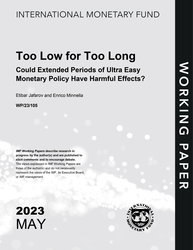
Too Low for Too Long: Could Extended Periods of Ultra Easy Monetary Policy Have Harmful Effects?
Too Low for Too Long: Could Extended Periods of Ultra Easy Monetary Policy Have Harmful Effects?
READ MORE...
Volume/Issue:
Volume 2023
Issue 105
Publication date: May 2023
ISBN: 9798400241314
$20.00
Add to Cart by clicking price of the language and format you'd like to purchase
Available Languages and Formats
| English |
Prices in red indicate formats that are not yet available but are forthcoming.
Topics covered in this book
This title contains information about the following subjects.
Click on a subject if you would like to see other titles with the same subjects.
Banks and Banking , Finance , Economics- Macroeconomics , Money and Monetary Policy , Economics / General , Too Low for Too Long , Zombie Firms , Financial Stability , zombie firm , countercyclical monetary policy , monetary policy stance , sectoral zombie share , share of zombie , Economic recession , Output gap , Global financial crisis of 2008-2009 , Monetary expansion , Unconventional monetary policies , Global
Summary
Extended periods of ultra-easy monetary policy in advanced economies have rekindled debates about the zombification of weak companies and its impact on resource allocation, economic growth, inflation, and financial stability. Using both firm-level and macroeconomic data, we find that recessions are a critical factor in the rapid increase in the number of zombie firms. Expansionary monetary policy can help reduce zombification when interest rates are at the zero lower bound (ZBL), but a too-accommodative monetary policy for extended periods is associated with a higher probability of zombification. Small and medium enterprises are more likely to become zombie firms. This raises concerns about the sustainability of too-easy monetary policy implementation, especially in countries where growth is lackluster. Our findings imply a tradeoff between conducting a countercyclical monetary policy, which also helps contain the increase in the number of zombie firms in cyclical downturns, and using an expansionary monetary policy for long periods, which may lead to a combination of low interest rates, low growth, and high financial vulnerability. Such a tradeoff is not a concern currently when most countries are tightening their monetary policy stance, but policymakers should be mindful of it during future recessions.
Copyright © 2010 - 2026
Powered by:
AIDC



